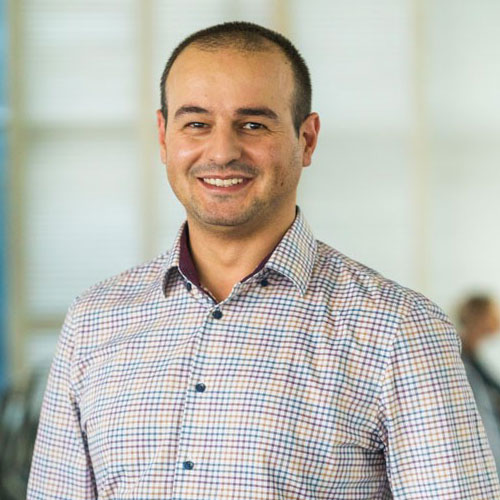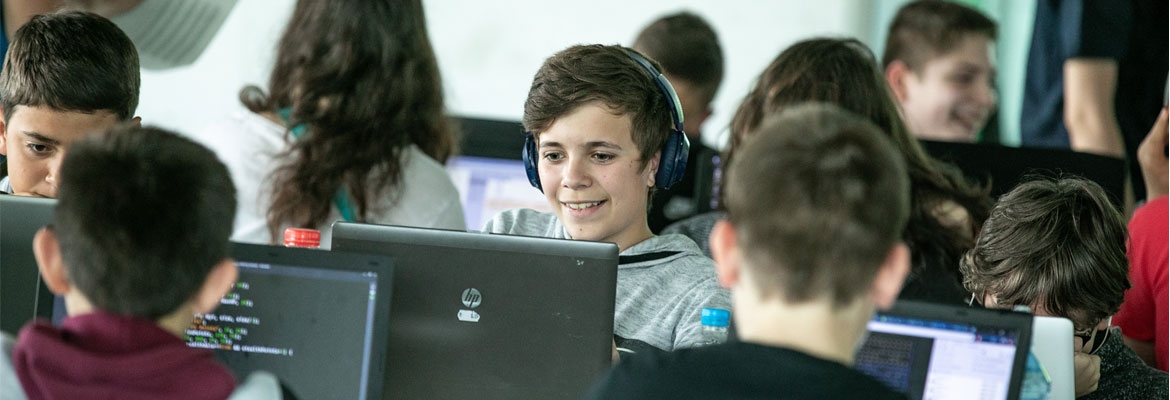Education is the main focus of the Questers Giving Programme and throughout the years, we’ve collaborated with and supported many incredible organisations that work to improve the schooling system in Bulgaria and to ensure better educational opportunities for students nationwide. One such organisation is Telerik Academy School – the largest free IT education initiative for children in the country. We’ve been supporting them for two years now and decided to invite their CEO Petar Sharkov to share more about their work. Petar Sharkov is responsible for the long-term strategy of Telerik Academy School and oversees all key partnerships with educational institutions, businesses and communities.
 Read what he shared about the academies they are establishing across the country and the impact they have on children’s future professional development and the IT labour market in general.
Read what he shared about the academies they are establishing across the country and the impact they have on children’s future professional development and the IT labour market in general.
Tell us more about Telerik Academy School. What’s the purpose of the organization?
Telerik Academy School is the biggest private tech-ed initiative for kids in Bulgaria. Our mission is to provide equal access to free modern tech training to 3rd-12th graders and prepare them for the digital future. Our end goal - help Bulgarian children become in-demand professionals, active citizens, digital leaders and bold inventors.
When and how was the idea conceived? How has Telerik Academy School changed over the years?
For 12 years we have trained more than 17,000 students in programming and digital science, equipping them with the key skills for the digital economy and fostering their logical thinking, creativity, and problem-solving skills. In 2022-2023 alone we will train more than 2,900 students in 140 cohorts in 47 cities in Bulgaria (we cover 96% of the districts). Telerik Academy School successfully offers free training at a local level and creates the conditions for students in smaller settlements to learn and develop skills necessary for their future careers.
What are your biggest challenges and how do you overcome them?
The Ministry of Education and Culture says that in 10 years, 85% of the professions will be completely unknown to us today, and the main part of them will be in the technological sector. Although experts offer different predictions for the professions of the future, all agree that technological skills, natural and engineering sciences and mathematics will be key. To be competitive and prepared for the professions of the future, children must have digital competencies, adapt and learn quickly, develop logical thinking and know the language of technology - programming.
Digital literacy is becoming more and more mandatory. Career opportunities in the future will require digital skills. Digital literacy should be as important to people as functional literacy. It shouldn't be seen as a "nice to have" but a "must have". As an organization, we are committed to talking about the topic and helping people understand why these skills are so important.
As an organization what’s your biggest achievement so far?
There is no greater feeling than igniting a spark in a child and guiding them towards a promising profession.
One of the biggest achievements of the program in the past three years is its outreach to smaller towns in the country where opportunities for developing the IT knowledge and skills of children are limited or even missing, or the financial barrier for doing it is high for the parents.
Telerik Academy School has a significant impact on the labor market in Bulgaria: In 2020, 93% of the estimated 1,850 18+ alumni who had IT-related jobs worked in Bulgaria. They represented approximately 5% of the total number of people employed in the IT sector in Bulgaria in 2020. This is a huge contribution of a single program.
You have created a network of IT academies across the country and teach children digital skills to prepare them for the future. Share how you structure these academies. How do they engage the young students?
To start a group in a city and at the same time preserve the free education model, 3 key elements need to be in place - funding, infrastructure and teachers.
We rely on the financial support of like-minded people. In the country, Telerik Academy School is implemented with the support of the "America for Bulgaria" Foundation. But we also rely on individual donors, organizations and businesses like Questers.
We partner with municipalities, schools and private training centers to provide computer-equipped classrooms. We work with teachers and specialists in the field of programming who lead the training.
At Telerik Academy School, we believe that programming, like foreign languages, is most easily learned in early childhood and the program must be tailored to the specific age group. We have divided our programs into 4 age groups, adapting the material to the age of the students and are taught in a language accessible to them.
The programs are very hands-on and interactive for the students. From day one, they start creating programs and games, participate in competitions, present what they have learned. Thus, they immediately begin to see the result of the acquired skills.
Students come willingly and eagerly await our classes. Parents share that the interest we arouse in programming and technology is transferred to several other subjects and to learning in general.
What about the academies in the towns of Montana and Sevlievo that Questers supports? Can you share more details about them? How many children will take part this school year?
During this school year Questers supports two groups in the country:
Game Development for grades 5-7 in the city of Montana, with teacher Tsvetelina Stoyanova. There are 18 children participating in the group.
Web Development for grades 5-7 in Sevlievo, with teacher Simeon Gelovski. 18 children take part in the group.
Are you planning any new initiatives or opening academies in other locations?
In the upcoming school year, we will focus on finding new opportunities for groups across the country where even more students have the opportunity to immerse themselves in the world of technology and programming.

